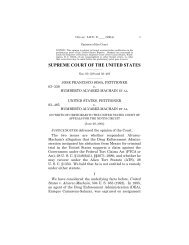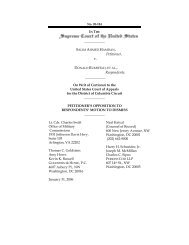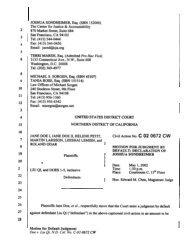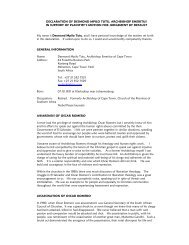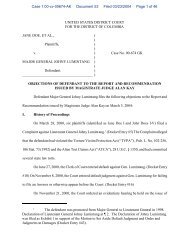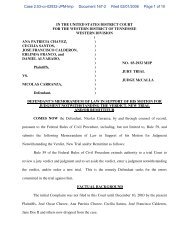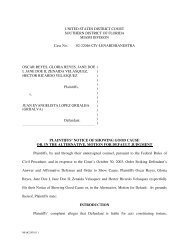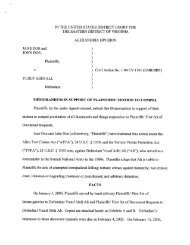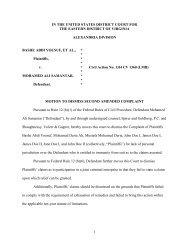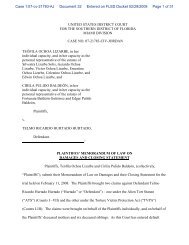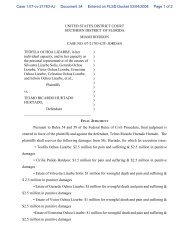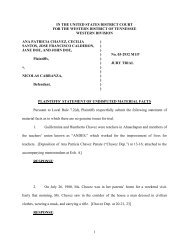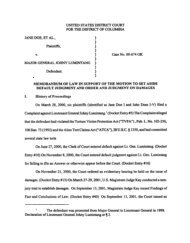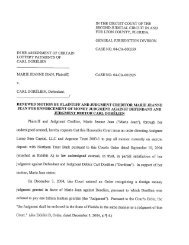ANNUAL REPORT | 2009-2010 - Center for Justice and Accountability
ANNUAL REPORT | 2009-2010 - Center for Justice and Accountability
ANNUAL REPORT | 2009-2010 - Center for Justice and Accountability
Create successful ePaper yourself
Turn your PDF publications into a flip-book with our unique Google optimized e-Paper software.
INTRODUCTION<br />
“Universal Jurisdiction” is the doctrine of international<br />
law that holds that certain crimes are so egregious that<br />
the perpetrators may be held accountable wherever<br />
they are found. These crimes include genocide,<br />
crimes against humanity, war crimes, <strong>and</strong> torture.<br />
The doctrine provided the legal foundation <strong>for</strong> the<br />
Nuremberg trials against Nazi war criminals. More<br />
recent events – including the arrest of Chilean General<br />
Augusto Pinochet in London, the establishment of the<br />
International Criminal Tribunals <strong>for</strong> the Former Yugoslavia<br />
<strong>and</strong> Rw<strong>and</strong>a, the prosecution of Liberian dictator Charles<br />
Taylor in Sierra Leone <strong>and</strong> the establishment of the International<br />
Criminal Court – all reflect the growing determination of the international<br />
community to carry <strong>for</strong>ward the Nuremberg legacy of bringing individuals to justice <strong>for</strong><br />
violations of international law that shock the conscience of humanity. CJA plays a leading<br />
role in this emerging area of international justice by pursuing universal jurisdiction cases.<br />
In the U.S., we hold perpetrators of international human rights abuses accountable<br />
through civil litigation. In Spain, we pursue criminal human rights cases be<strong>for</strong>e the<br />
Spanish National Court. CJA has pioneered a survivor-centered approach to the quest<br />
<strong>for</strong> justice that combines legal representation with medical <strong>and</strong> psycho-social services<br />
to both empower <strong>and</strong> heal torture survivors <strong>and</strong> their communities.<br />
“Transitional <strong>Justice</strong>” refers to a range of judicial <strong>and</strong> non-judicial strategies that are<br />
used to deal with a legacy of human rights abuses <strong>and</strong> armed conflict in a given country.<br />
These strategies have a variety of goals: to hold those who had “comm<strong>and</strong> responsibility”<br />
<strong>for</strong> systematic abuses legally accountable; to help repair social divisions caused by conflict;<br />
to provide survivors with a full accounting <strong>and</strong> acknowledgement of the abuses that<br />
occurred; to offer material <strong>and</strong> moral reparations to survivors; <strong>and</strong> to re<strong>for</strong>m key state<br />
institutions, including the military, police <strong>and</strong> judiciary, to ensure that the pattern of human<br />
rights violations is not repeated.<br />
From joining as co-counsel in the historic prosecution of Peruvian <strong>for</strong>mer President<br />
Alberto Fujimori <strong>for</strong> crimes against humanity, to managing the distribution of over<br />
$400,000 in damages awards to massacre survivors in one of Haiti’s poorest communities,<br />
CJA is advancing transitional justice goals in countries where abuses have occurred.<br />
4




